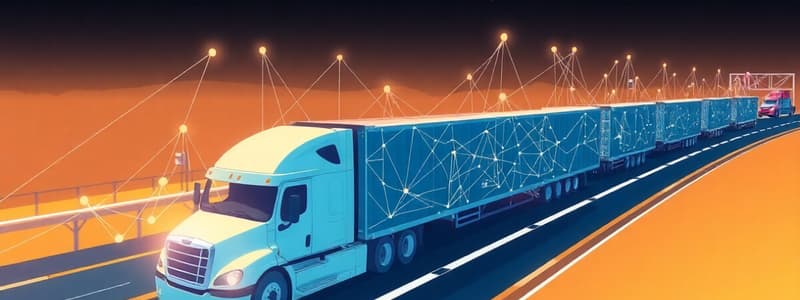Podcast
Questions and Answers
What is the estimated annual value of the logistics sector in India?
What is the estimated annual value of the logistics sector in India?
What percentage of India's GDP is attributed to logistics costs?
What percentage of India's GDP is attributed to logistics costs?
How many people does the logistics sector employ in India?
How many people does the logistics sector employ in India?
What is the aspirational logistics cost percentage for developed countries?
What is the aspirational logistics cost percentage for developed countries?
Signup and view all the answers
At what CAGR is the logistics sector in India growing?
At what CAGR is the logistics sector in India growing?
Signup and view all the answers
What is the significance of the 'IBMD' label in the context of supply chain networks?
What is the significance of the 'IBMD' label in the context of supply chain networks?
Signup and view all the answers
In supply chain terminology, what does 'Multi Model' likely refer to?
In supply chain terminology, what does 'Multi Model' likely refer to?
Signup and view all the answers
What does the label 'Shed-10' signify in the context of the presented diagram?
What does the label 'Shed-10' signify in the context of the presented diagram?
Signup and view all the answers
What role does 'CRM' play in the supply chain network indicated?
What role does 'CRM' play in the supply chain network indicated?
Signup and view all the answers
Which supply type is suggested by the label 'Direct Supply'?
Which supply type is suggested by the label 'Direct Supply'?
Signup and view all the answers
Which element is most likely to involve serviceability within the supply chain?
Which element is most likely to involve serviceability within the supply chain?
Signup and view all the answers
What could 'Cost' imply in the context of supply chain analysis?
What could 'Cost' imply in the context of supply chain analysis?
Signup and view all the answers
Study Notes
SAKSHAM: IL6 Webinar for Logistics - Network Design
- India's logistics sector is one of the largest globally, estimated at $215 billion, growing at 10.5% CAGR.
- The sector employs 22 million people, according to Ministry of Commerce and Industry data.
- Logistics costs in India are estimated at 14% of GDP, comparable to other developing nations. Developed countries aim for 6-7% of GDP.
- Logistics costs are broken down as follows in the Indian supply chain: Transportation (6% of GDP), Warehousing (4% of GDP), Inventory (3% of GDP), and Order processing/admin (1% of GDP).
Supply Chain Community
- The supply chain community includes raw material supply, manufacturers, distributors, wholesalers, retailers, and end-users.
Comparison of Modes
- Truck: Cost-effective for short distances, quick delivery for short to medium distances. Capacity is limited by size and weight. Wide reach. Relatively reliable but susceptible to traffic and weather. Less fuel-efficient.
- Rail: Cost-effective for large volumes/long distances, high capacity. Slower than truck but comparable speed. Major market reach, but requires coordinating with trucks for first/last-mile delivery. Reliable, barring major delays. Fuel efficient.
- Water: One of the least expensive modes for shipping; accessible to navigable waterways. Very slow transit times, difficult to predict and control.
- Air: Fastest mode, especially for long distances; high carrying capacity. Accessible to most locations but requires airport infrastructure, and often requires truck pickup/delivery. Impacted by weather and possible delays. Most fuel-intensive mode.
Velotrade
- Includes various terms, such as EXW, FCA, FAS, FOB, CFR, CIF, CPT, CIP, DPU, DAP, and DDP for various seller/buyer responsibilities for the goods delivery. Different locations (port of loading/destination) and responsibilities (risk transfer) are clearly defined for each term.
Bird's Eye View of Supply Chain Network
- The supply chain network includes suppliers, manufacturers, warehouses/distribution centers, and customers.
- Material costs, manufacturing costs, transportation costs, and inventory costs are part of the overall network.
Geographical Spread of Inland Logistics Network
- The network is strategically positioned near mines and ports.
- Service levels strive for 2-day delivery pan-India.
- Warehouses and processing centers are located closer to demand to optimize delivery. Locations are detailed.
Logistics FG Material Movements and Flows
- Diagrams show various locations and processes involved in the movement of finished goods.
Strategic Supply Chain Network Design Framework
- Framework incorporates operational, tactical, and strategic layers.
- Layers encompass real-time feedback, firm business planning, sustenance, cost-effectiveness and alignment of strategies.
Cost & Service, Multi-Model, Multi-Node
- Cost and service ability are inversely proportional, where higher service requires increased cost.
- Multi-model and multi-node approaches are potential design strategies.
Type of Supply Chain Networks
- Includes direct supply, cross-docking, milk run, and hub-and-spoke networks.
Physical Distribution & Satellite Unit
- Details of stockyards (paved/unpaved/covered) across different geographical zones (North, West, East, and South).
Types of Supply Chains (Lean, Agile, Green, Closed-loop, Sustainable, Risk)
- Lean: Waste elimination, optimized processes.
- Agile: Enhanced responsiveness, flexibility.
- Green: Reduces environmental impact.
- Closed-loop: Incorporates reverse logistics.
- Sustainable: Combines social and environmental responsibility.
- Risk: Accounts for uncertainty, caused by economic crisis or natural disasters.
Customer Needs & Supply Characteristics
- Matrix categorizes customer demand and supply characteristics (predictable/unpredictable) and links these to different logistics strategies (Lean, Agile, etc.)
Transportation Models (1PL to 5PL)
- Classifies different service providers in a supply chain. 1PL to 5PL are stages of complexity and logistics service support/management.
- A 5PL example is shown.
Studying That Suits You
Use AI to generate personalized quizzes and flashcards to suit your learning preferences.
Related Documents
Description
This quiz explores the key aspects of India's logistics sector, including its economic impact, employment statistics, and cost composition. Participants will learn about the various components of logistics, including transportation modes and supply chain community dynamics. Test your knowledge of logistics principles and their significance in the rapidly growing Indian economy.




